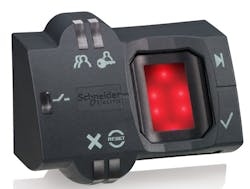Fingerprint-Recognition Switch Designed for Factories and Plants
Now comes Schneider Electric with a new security product based on
fingerprint identification technology that is designed to work in
challenging industrial environments.
On Feb. 1, the company launched what it bills as “the world’s first industrial switch to use biometric fingerprint-recognition technology” as a way to grant employee access to sensitive areas and machine functions. Schneider Electric’s Harmony Biometric Switch is the first fingerprint-reading device designed specifically for industrial environments where security is highly critical to everyday functions, but manufacturing conditions require security systems to be “industrially hardened,” the company says.
“Until now, this type of technology has not been available for use in industrial settings due to the often extreme conditions found in the plant,” says Selin Yilmaz, push button product manager for Schneider Electric. “Every plant manager knows the safety and operational consequences of unauthorized access: it can halt production, damage products being manufactured or disrupt your supply chain—and pose risk to employees, engineers and millions of dollars’ worth of equipment. This biometric technology, designed for plant conditions, can provide companies with more effective protection, while saving time and money and increasing productivity.”
The Harmony Biometric Switch reads fingerprint patterns to verify that someone is authorized to access sensitive areas and machine functions through an anonymous process in which fingerprints serve only to authorize access, not confirm an individual’s identity. Fingerprint readers have been shown to be more effective and efficient than other security systems, and they can also save money long-term, says Schneider Electric.
Industry experts estimate that up to 40 percent of all calls to IT help desks stem from password problems, and the average cost of each call ranges from $10 to $31. But fingerprint readers—unlike passwords, swipe cards or pin numbers—can’t be lost, stolen, borrowed, guessed or forgotten.
Similar to a key-operated selector switch, the Harmony Biometric Switch has two operating modes: on-off mode or pulse mode for momentary action. Authentication takes less than one second, and the false acceptance rate is less than 0.1 percent. The switches can remember up to 200 fingerprints, including several fingers from the same operator, for additional flexibility and precision. The new switch fits in a standard 22mm push-button mounting hole, resists mechanical shock and vibration, protects against EMC noise and UV light, meets IP65 and NEMA 12 standards, and offers an optional protective cover and guard, Schneider says.
Schneider Electric
www.us.schneider-electric.com
About the Author
Wes Iversen
Managing Editor

Leaders relevant to this article:
